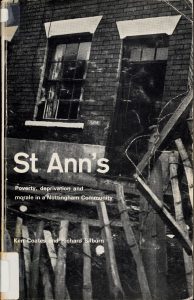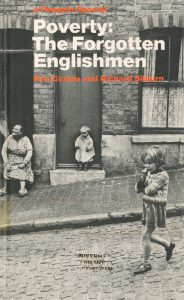February 22, 2023, by Kathryn Steenson
Adult Education and Workers’ Control
This is a guest post by Tony Simpson, from the Bertrand Russell Peace Foundation and Spokesman Books.
The ‘Knowledge is Power’ exhibition at Weston Gallery celebrates the University of Nottingham’s Adult Education Department. In the wake of the First World War, the Ministry of Reconstruction established a special committee which, in its final report in 1919, argued that adult education was a ‘permanent national necessity’. Such classes fostered active democracy, enriched communities, and nourished curiosity and love of learning. So it was that the University of Nottingham pioneered education for working class adults. In 1920, the first Department of Adult Education in Britain was established here. In 1922, Robert Peers became Britain’s first Professor of Adult Education. This story is recounted in some detail in an informative exhibition and stimulating and well-attended series of public lectures and film screenings. Many former students remember positively their encounter with adult education.

Ken Coates and Richard Silburn, Poverty, Deprivation and Morale in a Nottingham Community, 1967 Ref: UoNC Not 5.J2 COA
‘Class, Community and Adult Education’ is the exhibition’s sub-title. This echoes the triplet Poverty, Deprivation and Morale in a Nottingham Community, sub-title of the landmark enquiry into poverty amongst the working people of the city’s St Ann’s district. Students from the Shakespeare Street Adult Education Centre surveyed St Ann’s residents, calling at their houses. The preliminary findings of the St Ann’s Study Group were written up by Ken Coates, tutor in sociology in the Department of Adult Education, and Richard Silburn, lecturer in applied social science at the University of Nottingham. Subsequently, Coates and Silburn authored Poverty: The Forgotten Englishmen, the classic text familiar to generations of sociology students, which recounts the lives of the working poor and their neighbours. It resonates still.
John Holford, current Professor of Adult Education, has combined with Manuscripts and Special Collections at the University of Nottingham to assemble a thoughtful and provocative show which poses a question in the mind of this former student why this enriching, creative and mutually instructive practice of adult education has been run down and squandered in recent decades.
In autumn 1979, I enrolled for my first evening class at the Adult Education Centre in Shakespeare Street in the middle of Nottingham. It was ‘Political Power in Britain’, taught by Ken Coates. I had recently read Poverty: The Forgotten Englishman, which I found in a bookshop in Belgrade, where I was researching the Yugoslav ‘self-managed’ economy. I’d learned some Serbo-Croat in the Department of Slavonic Studies at Nottingham University, which I was applying in studies at Oxford.
Earlier in 1979, Mrs Thatcher had been elected for the first time, and this was to bring many deleterious changes, including for adult education. ‘Thatcherism’ was just getting into its stride. Ken’s vocation was to ‘teach, not preach’ and it was notable how constructively he engaged with the wide range of political opinions expressed by two dozen adults on a weekly basis. All through the long winter, we turned up because the discussion was interesting, and our curiosity was aroused. So it was that horizons broadened, even as ‘monetarism’ took hold and VAT soared from 8 to 15 per cent, while Mrs Thatcher made initial steps to put publicly owned industries, which represented massive investment in the utilities and other public infrastructure, in private hands. Tony Benn MP was an outspoken critic of her policies.
Benn came to Nottingham to speak at conferences organised by the Institute for Workers’ Control. The IWC was formed in 1968, but its Nottingham roots went deeper. In April 1964, a day school on industrial democracy was convened at the Shakespeare Street Adult Education Centre. ‘After resting dormant for two generations, the movement for workers’ control in Britain has once again begun to stir,’ wrote Ken Coates in his 1965 essay ‘Democracy and Workers’ Control’. That lengthy hibernation stretched back before the First World War and the syndicalist upheavals nurtured by Tom Mann and others. Coates shared an interest in and enthusiasm for syndicalism with Bertrand Russell, with whom he was starting to work. Coates recalled that the Shakespeare Street meeting attracted more than a hundred participants ‘drawn from most unions and a number of universities’.[1]
The Nottingham meeting highlighted the participation of adult educators from elsewhere in Britain such as Michael Barratt Brown from Sheffield and founding principal of Northern College near Barnsley, and Tony Topham from Hull University. This network of adult educators extended to include John Hughes, warden of Ruskin College, Oxford. Audrey Wise MP was to chair the IWC. Its secretary was Ken Fleet, chartered accountant and participant in the St Ann’s Study Group.
Adult education and the Labour Movement’s engagement with industrial democracy again became closely connected. Tutors learned from their students, as many had publicly acknowledged, in a two-way exchange. This process is extensively documented in the archives of the IWC and of Ken Coates held at the University of Nottingham’s Manuscripts and Special Collections, which assembled this important and timely exhibition.
Adult education remains a ‘permanent necessity’ in the 21st Century, all the more so as the need currently goes largely unmet.
[1] Ken Coates, Workers’ Control: Another World is Possible, p. 54
No comments yet, fill out a comment to be the first


Leave a Reply